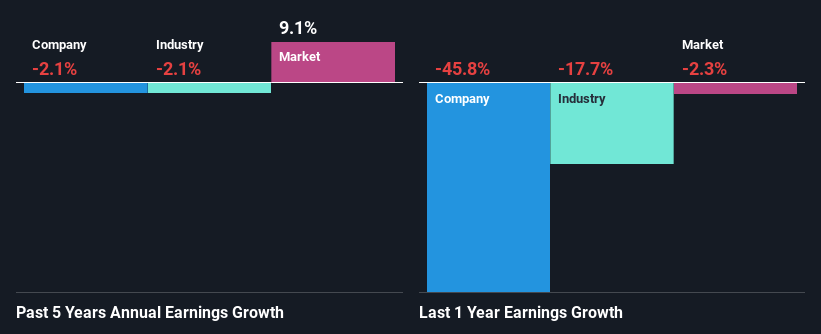Volution Group plc's (LON:FAN) On An Uptrend But Financial Prospects Look Pretty Weak: Is The Stock Overpriced?
Most readers would already be aware that Volution Group's (LON:FAN) stock increased significantly by 38% over the past three months. We, however wanted to have a closer look at its key financial indicators as the markets usually pay for long-term fundamentals, and in this case, they don't look very promising. Specifically, we decided to study Volution Group's ROE in this article.
ROE or return on equity is a useful tool to assess how effectively a company can generate returns on the investment it received from its shareholders. Put another way, it reveals the company's success at turning shareholder investments into profits.
Check out our latest analysis for Volution Group
How Is ROE Calculated?
The formula for ROE is:
Return on Equity = Net Profit (from continuing operations) ÷ Shareholders' Equity
So, based on the above formula, the ROE for Volution Group is:
5.9% = UK£11m ÷ UK£179m (Based on the trailing twelve months to January 2021).
The 'return' is the income the business earned over the last year. That means that for every £1 worth of shareholders' equity, the company generated £0.06 in profit.
Why Is ROE Important For Earnings Growth?
We have already established that ROE serves as an efficient profit-generating gauge for a company's future earnings. Based on how much of its profits the company chooses to reinvest or "retain", we are then able to evaluate a company's future ability to generate profits. Assuming everything else remains unchanged, the higher the ROE and profit retention, the higher the growth rate of a company compared to companies that don't necessarily bear these characteristics.
Volution Group's Earnings Growth And 5.9% ROE
When you first look at it, Volution Group's ROE doesn't look that attractive. However, its ROE is similar to the industry average of 5.9%, so we won't completely dismiss the company. But Volution Group saw a five year net income decline of 2.1% over the past five years. Remember, the company's ROE is a bit low to begin with. So that's what might be causing earnings growth to shrink.
Next, on comparing with the industry net income growth, we found that Volution Group's earnings seems to be shrinking at a similar rate as the industry which shrunk at a rate of a rate of 2.1% in the same period.
The basis for attaching value to a company is, to a great extent, tied to its earnings growth. What investors need to determine next is if the expected earnings growth, or the lack of it, is already built into the share price. This then helps them determine if the stock is placed for a bright or bleak future. One good indicator of expected earnings growth is the P/E ratio which determines the price the market is willing to pay for a stock based on its earnings prospects. So, you may want to check if Volution Group is trading on a high P/E or a low P/E, relative to its industry.
Is Volution Group Using Its Retained Earnings Effectively?
With a high three-year median payout ratio of 55% (implying that 45% of the profits are retained), most of Volution Group's profits are being paid to shareholders, which explains the company's shrinking earnings. With only a little being reinvested into the business, earnings growth would obviously be low or non-existent. Our risks dashboard should have the 3 risks we have identified for Volution Group.
In addition, Volution Group has been paying dividends over a period of six years suggesting that keeping up dividend payments is preferred by the management even though earnings have been in decline. Upon studying the latest analysts' consensus data, we found that the company's future payout ratio is expected to drop to 30% over the next three years. Accordingly, the expected drop in the payout ratio explains the expected increase in the company's ROE to 18%, over the same period.
Conclusion
On the whole, Volution Group's performance is quite a big let-down. Because the company is not reinvesting much into the business, and given the low ROE, it's not surprising to see the lack or absence of growth in its earnings. Having said that, looking at current analyst estimates, we found that the company's earnings growth rate is expected to see a huge improvement. To know more about the latest analysts predictions for the company, check out this visualization of analyst forecasts for the company.
This article by Simply Wall St is general in nature. It does not constitute a recommendation to buy or sell any stock, and does not take account of your objectives, or your financial situation. We aim to bring you long-term focused analysis driven by fundamental data. Note that our analysis may not factor in the latest price-sensitive company announcements or qualitative material. Simply Wall St has no position in any stocks mentioned.
Have feedback on this article? Concerned about the content? Get in touch with us directly. Alternatively, email editorial-team (at) simplywallst.com.

 Yahoo Finance
Yahoo Finance 
